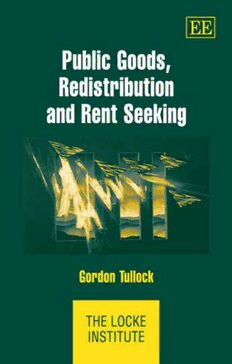
Public Goods, Redistribution and Rent Seeking PDF
Preview Public Goods, Redistribution and Rent Seeking
Public Goods, Redistribution and Rent Seeking The Locke Institute General Director Financial Director Charles K.Rowley,Ph.D. Robert S.Elgin,M.A. Director of Legal Studies Program Director Amanda J.Owens,Esq.,J.D. James T.Bennett,Ph.D. Editorial Director Conference Director Arthur Seldon,C.B.E. Marjorie I.Rowley Founded in 1989,The Locke Institute is an independent,non-partisan,edu- cational and research organization.The Institute is named for John Locke (1632–1704), philosopher and political theorist, who based his theory of society on natural law which required that the ultimate source of political sovereignty was with the individual.Individuals are possessed of inalienable rights variously defined by Locke as ‘life,health,liberty and possession’,or, more directly, ‘life, liberty and property’. It is the function of the state to uphold these rights since individuals would not enter into a political society unless they believed that it would protect their lives,liberties and properties. The Locke Institute seeks to engender a greater understanding of the concept ofnatural rights,its implications for constitutional democracry and for economic organization in modern society.The Institute encourages high- quality research utilizing in particular,modern theories of property rights, public choice,law and economics,and the new institutional economics as a basis for a more profound understanding of important and controversial issues in political economy.To this end,it commissions books,monographs and shorter studies involving substantive scholarship written for a wide audi- ence, organizes major conferences on fundamental topics in political economy,and supports independent research.The Institute maintains a pub- lishing relationship with Edward Elgar Publishing.It also publishes its own monograph series. In order to maintain independence,The Locke Institute accepts no gov- ernment funding.Funding for the Institute is solicited from private founda- tions, corporations and individuals. In addition, the Institute raises funds from the sale ofpublications and from conference fees.The Institute is incor- porated in the State of Virginia, USA, and enjoys non-profit, tax-exempt status under Section 501(c)3 of the United States Internal Revenue Code. Officers of the Institute are listed above.Please direct all enquiries to the address given below. 5188 Dungannon Road,Fairfax,Virginia 22030,US Tel.(703) 934-6934 Fax (703) 934-6927 email:[email protected] http://www.TheLockeInstitute.org Public Goods, Redistribution and Rent Seeking Gordon Tullock George Mason University,USA The Locke Institute Edward Elgar Cheltenham,UK • Northampton,MA,USA © Gordon Tullock,2005 All rights reserved.No part of this publication may be reproduced,stored in a retrieval system or transmitted in any form or by any means,electronic, mechanical or photocopying,recording,or otherwise without the prior permission of the publisher. Published by Edward Elgar Publishing Limited Glensanda House Montpellier Parade Cheltenham Glos GL50 1UA UK Edward Elgar Publishing,Inc. 136 West Street Suite 202 Northampton Massachusetts 01060 USA A catalogue record for this book is available from the British Library ISBN1 84376 637 X (cased) PrintedandboundinGreatBritainbyMPGBooksLtd,Bodmin,Cornwall Contents Preface vii 1. Some difficulties in the existing theory of 1 externalities 2. Coase and all that 18 3. More on why government? 28 4. The poor 39 5. The legacy of Bismarck 49 6. Some biological problems 56 7. The rich 66 8. A survey of the existing system 75 9. Rent seeking 92 10. War 101 11. Monarchies and dictatorships 114 12. What,if anything,should we do? 132 References 146 Index 149 v Preface I started on this book just as the difficulties with Iraq were beginning to heat up.As a reader will remember,we took quite a while getting ready to move. Thus a sort of war atmosphere was present while I was writing the manuscript. I don’t, however, think this had much impact on it. I have a few men- tions of the war and of terrorism but they certainly don’t domi- nate the book. Basically it is a revision and improvement of the public choice literature on why we have a state, and why it would be nice if it worked better.It’s easy enough to read so that it could be used for students who have had no introduction to public choice,but I have enough new ideas in it so that it should be of interest to more advanced scholars too. At the end I propose some fairly radical revisions to the US Constitution intended both to make it fairer by giving citizens of different states equal representation in a revised Senate and making it harder to engage in the kind of rent seeking which tends to make us poorer.The last is rather radical,but I am well known to be radical,albeit in an unusual direction. vii
